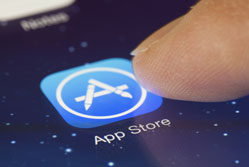Bring your own device? It's really about the apps
Bring your own device? It's really about the apps
 The world of work has changed unbelievably in the last decade. And it's thanks, almost entirely, to advances in technology. The 9-5 model is no longer a necessity. We now have the right and the opportunity to be pickier about how we work
The world of work has changed unbelievably in the last decade. And it's thanks, almost entirely, to advances in technology. The 9-5 model is no longer a necessity. We now have the right and the opportunity to be pickier about how we work
Flexible working has come on in strides. In the UK, employees have the right to request it. As a result, bring your own device (BYOD) policies are now commonplace.
BYOD means allowing your employees to use their own devices - usually smart phones and tablets - for work. Some companies have embraced BYOD as a way to enable smarter working without having to spend a fortune on mobile devices.
Often, employees like BYOD too, because they can use their preferred device for work - and don't have to carry two smart phones with them.
How far can BYOD take you?
When employees can access company data securely on their own PCs, laptops, and mobile devices, they can work more easily and efficiently.
But it shouldn't stop there. As nice as it is, the modern employee - and top talent in particular - demands more. It's not unreasonable for them to do so, either. It's entirely possible for them to work flexibly and fulfil their job duties without any additional cost to your business.
A big part of this is letting them use software they're comfortable with instead of forcing them to make do with something they don't like. I've taken to calling this 'choose your own application' (CYOA).
Of course, a few ground rules need to be put in place before you implement a CYOA policy. If you use group messaging apps, employees will need to use the same one. You all need to be on it, no matter whether it's Slack, Facebook Messenger or something else.
Another fundamental rule has to be that nobody starts using awkward file extensions. For instance, if you're a media company and a staffer insists on sending you video files in QuickTime's .mov format while you're all using .mp4, you need to have a word.
Outside situations like those, it's generally smart to trust people to get on with things. Modern cloud software lets workers access all the business-critical information they need from wherever they are, on any device – and safely.
So whether an employee is using Microsoft Office or Google Docs is beside the point. I personally prefer to use Word to draft my proposals, but if someone does dazzling work with different software, it shouldn't matter.
The cloud is everywhere
When we talk about the virtues of cloud technology, we tend to emphasise location.
It's true, the cloud is everywhere, and it lets us be everywhere too: we can work from home, from the beach, or pretty much anywhere there's an internet connection.
But while the cloud does let your employees choose where they work from, it's equally important to remember that it can empower them to choose how they work – if you let them.
In 2015, being able to CYOA is just as important as being able to BYOD.
Copyright 2015 © Simon Osman, CEO of iFollowOffice
- The BYOD fear factor
- How to get your BYOD policy right
- When you should embrace employees who bring their own
Image: ymgerman / Shutterstock.com




Comments
Add a comment